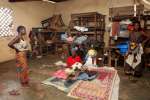- Text size
 |
|  |
|  |
| 
- Français
Ivorian refugee repatriation from Liberia this year tops 10,000 mark
News Stories, 30 July 2013
MONROVIA, Liberia, July 30 (UNHCR) – More than 10,000 Ivorians have returned home so far this year from Liberia with UNHCR help, almost double the figure for the whole of last year.
The landmark was passed late last week. The refugees, mostly living in camps and communities in Grand Gedeh, Nimba, Maryland and River Gee counties in Liberia, have returned to areas such as Toulepleu, Tabou and Danane in western Côte d'Ivoire.
The UN refugee agency, in collaboration with the Liberia Refugee Repatriation and Resettlement Commission and other partners, has been organizing road convoys for those wishing to return more than two years after fleeing post-election violence in Côte d'Ivoire. Those heading back from Maryland County cross the Cavalla River to Côte d'Ivoire on a barge operated by UNHCR.
"Last year, we facilitated the repatriation of more than 6,000 refugees. For this year, our planning figure is to facilitate the repatriation of 16,000 refugees," said UNHCR Officer-in-Charge Andrew Mbogori, thanking donors for supporting the repatriation efforts.
"With 10,000 refugees repatriated over the past seven months, notwithstanding border security concerns a few months ago, we are definitely on track to attain our target," he added.
Over the past year, the repatriation of Ivorian refugees had been interrupted by attacks on villages on the Ivorian side of the border and the killing of seven UN peacekeepers in June last year. "We welcome the improvement in border security, which is encouraging more refugees to return, and we hope the security situation will continue to improve," remarked Mbogori.
Many of those crossing the border at the Cavalla River stressed that the improved security had been a major factor in their decision to return. "Now that security has improved in my country, I am happy to be returning to Tabou region to maintain my cocoa plantation, which is my main source of income," said Pierre, a father of five, as he crossed into Côte d'Ivoire, the word's largest cocoa-producing country.
Other refugees are returning to continue their education back home. "I was at a university in Abidjan which closed in 2011 as a result of the post-election violence [from November 2010 to April 2011]. Now that it has reopened and there is peace in our capital, I am happy to go back and continue my education," said 25-year-old Gnato.
Deteriorating road conditions with seasonal rains are, however, new challenges to the repatriation process. "We are engaged in road rehabilitation activities, as well as working with partners such as the UN Mission in Liberia engineers to keep roads open. As long as we have refugees willing to return home, we want to ensure that we assist them to do so in safety and in dignity," said UNHCR official Fatima Mohammed.
Upon return to Côte d'Ivoire, former refugees receive a cash grant, food and non-food items. Liberia currently hosts more than 58,000 Ivorian refugees.
The Côte d'Ivoire crisis began after the presidential election of November 2010, which pitted incumbent Laurent Gbagbo against Alassane Ouattara. Fighting caused widespread displacement and at the peak more than 220,000 Ivorian had fled to Liberia. Most returned home on their own after election winner Ouattara gained power. A repatriation operation was launched late that year, gaining steam in 2012.
By Sulaiman Momodu in Monrovia, Liberia



























































